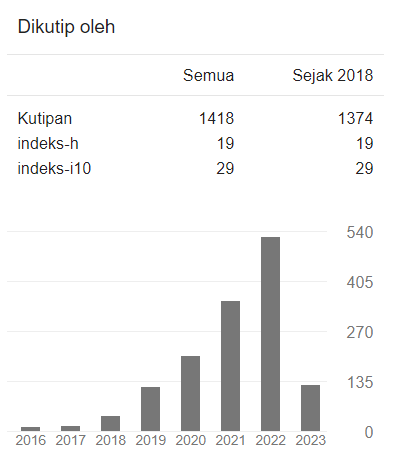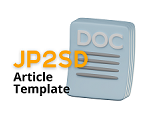Penerapan Media Flipbook untuk Meningkatkan Literasi Membaca Siswa SD
DOI:
https://doi.org/10.22219/jp2sd.v10i1.19837Abstract
Indonesia is one of the countries in Asia with low reading literacy skills. Therefore, the mastery of reading literacy is vital for students and the Indonesian people. This study aims to describe the process of implementing flipbook media that can improve the reading literacy of 2nd graders of elementary school and measure the improvement of their reading literacy after the application of flipbook media. The method used is Classroom Action Research. The data collection uses observation techniques and documentation, and the literacy tests uses test sheets and documentation. The subjects of this research are 17 elementary school students in the 2nd grade of Muhammadiyah Elementary School 8 Surabaya. Based on the study results, the data show that flipbook media was applied online at the habituation stage and was carried out for 15 minutes before reading. The application of online-based flipbook media can improve students’ reading literacy and learning activities of the 2nd-grade students of Muhammadiyah Elementary School 8 Surabaya. The increase in reading literacy results can be seen in the literacy test results carried out in 2 learning cycles. Before applying flipbook, the result of classical literacy completeness was 29.41%. In the first cycle, the acquisition of classical reading literacy mastery was 47.06%, while in the second cycle, the classical completeness was 82.35%. So, it can be concluded that the use of flipbook media can improve the reading literacy of the 2nd-grade students of Muhammadiyah Elementary School 8 Surabaya
Downloads
References
Agoestyowati, R. (2017). Branding Serial KKPK: Tinjauan Pada Minat Literasi Anak-Anak. Bijak Majalah Ilmiah Institut STIAMI, 549(01), 40–42.
Anggrasari, L. A., Dayu, D. P. K., Widihantari, T. A., & Setyaningsih, N. D. (2021). The Effect of the Use of Flipbook Culture Story Media on Reading Literations of Elementary School Students. Kemajuan Dalam Peneitian Ilmu Social Dan Humanoria, (Online), 524(Icce 2020), 129–133, (https://doi.org/10.2991/assehr.k.210204.020), diakses 28 Oktober 2021
Arikunto, S., Supardi, & Suhardjono. (2021). Penelitian Tindakan Kelas. Jakarta: PT Bumi Aksara.
Arsyad, A. (2015). Media Pembelajaran. Jakarta: PT. Rajagrafindo Persada.
Dewi, I. A., Suardana, I. P. O., & Numertayasa, I. W. (2021). Pengembangan Bahan Bacaan Literasi Kelas Rendah dengan Memanfaatkan Cerita Folklor Bali. Jurnal Elementary, 4(1), 53–59.
Febriansyah, F., Herlina, K., Nyeneng, I.D.P & Abdurrahman, A. (2021). Developing Electronic Student Worksheet (E-Worksheet) Based project Using Fliphtml5 to Stimulate Science Prosess Skill During The Covid-19 Pandemic. Integrative Science Education and Teaching Activity Journal. Vol. 2 (1): hal 59-73.
Fitri, N. D., & Syafiqoh, N. (2020). Pengembangan Media Buku Digital Flipbook Untuk Meningkatkan Kemampuan Membaca Permulaan Pada Anak Kelompok A TK Al-Azhhariyyah Sekargeneng Lamongan. Jurnal IKA PGSD (Ikatan Alumni PGSD) UNARS, (Online), 8(2), 471, (https://doi.org/10.36841/pgsdunars.v8i2.850), diakses 29 Oktober 2021
Gogahu, D. G. S., & Prasetyo, T. (2020). Pengembangan Media Pembelajaran Berbasis E-Bookstory untuk Meningkatkan Literasi Membaca Siswa Sekolah Dasar. Jurnal Basicedu, (Online), 4(4), 1004–1015, (https://doi.org/10.31004/basicedu.v4i4.493), diakses 29 Oktober 2021.
Halaiyah, T., & Wahid, F.I. (2020). Pengembangan Media Big Book Berbasis Budaya Banten untuk Meningkatkan Literasi Membaca Sastra Siswa Kelas Awal. Prosiding Seminar Nasional Pendidikan FKIP. Vol. 3(1): hal 84-96.
Harsiati, T., & Priyatni, E.T. (2017). Karakteristik Tes Literasi Membaca Pada Programme For International Student Asessment (PISA). Jurnal Bibliomatika. Vol. 4(2): hal 1-11
Hasanah, S. N., Cholily, Y. M., Effendi, M.M., & Putri, O. R.U. (2021). Literasi Digital Siswa Dalam Pembelajaran Matematika Berbantuan Media Space Geometry Flipbook (SGF). Jurnal Program Studi Pendidikan Matematika, (Online), 3(10), 1736-1744, (https://ojs.fkip.ummetro.ac.id/index.php/matematika/article/view/3898/pdf), diakses 4 Februari 2021.
Indarti, Titin. 2008. Penelitian Tindakan Kelas (PTK) dan Penulisan Ilmiah; Prinsip-prinsip Dasar, Langkah-langkah, dan Implementasinya. Surabaya: Lembaga Penerbit FBS Unesa.
Kalalo, R. J. P., Lumenta, A. S. M., & Paturusi, S. D. E. (2021). The Effects of Interactive Online Learning Using Flipbook on The Process and Results of Blended Learning. Jurnal Teknik Informatika, 16(2), 165–174.
Kemendikbud. 2019. Model Pembelajaran Literasi untuk pembaca Awal. Jakarta Timur: Badan Pengembangan Bahasa dan perbukuan.
Maisarah. (2020). PTK dan Manfaatnya Bagi Guru. Bandung: Media Sains Indonesia.
Muhajir, S., & Rohaeti, E. (2015). Perbedaan Penerapan Model Pembelajaran STS dan CTL Terhadap Literasi Sains dan Prestasi Belajar IPA. Jurnal Pendidikan Matematika dan Sains.(2): hal 143-155.
Mulyadi, D.U., Wahyuni, S., & Handayani, R.D (2016). Pengembangan Media Flash Flipbook untuk Meningkatkan Keterampilan Berfikir Kreatif Siswa dalam Pembelajaran IPA di SMP. Jurnal Pembelajaran Fisika. Vol. 4(4): hal. 49-54.
Mulyadi, Eko. (2015). Penerapan Model Problem Based Learning untuk Meningkatkan Kinerja dan Prestasi Belajar Fisika Siswa SMK. Jurnal Pendidikan Teknologi dan Kejuruan. Vol. 22 (4): hal 365-395.
Mustafa, Gusdiyanto, Victoria, Masgumelar, dkk., (2020). Metodelogi Penelitian Kuantitatif, Kualitatif, dan Penelitian Tindakan Kelas dalam Pendidikan Olahraga. Malang: Universitas Negeri Malang.
Pakhpahan, Ardiana, Mawati, Wagiu, Simarmata, Mansyur, Purba, Chamidah, Jamaludin, Iskandar. (2020). Pengembangan Media Pembelajaran. Yayasan Kita Menulis.
Patriana, W. D., Wulandari, M. D., & Sutama. (2021). Pengelolaan Pembelajaran Berorientasi Literasi Numerasi di Sekolah Dasar dalam Kegiatan Kurikuler dan Ekstrakurikuler. Jurnal Pemikiran dan Pengembangan Sekolah Dasar, (Online), Vol. 9(2): hal: 116-131, (https://ejournal.umm.ac.id/index.php/jp2sd/article/view/17906/9887), diakses 1 Maret 2021
Permatasari, Sindi. (2018). Respon Siswa Terhadap Flip Book Pembelajaran Bioteknologi Berbasis Fermentasi Khas Kalimantan Barat di SMA Kubu Raya. Pontianak: Universitas Muhammadiyah Pontianak
Pratiwiningtyas, B.N., Susilaningsih, E., & Sudana, I.M. (2017). Pengembangan Instrumen Penilaian Kognitif Untuk Mengukur Literasi Membaca Bahasa Indonesia Berbasis Model Pirls pada Siswa Kelas IV SD. Jurnal of Educational Research and Evaluation. Vol. 6(1): hal 1-9.
Puspitasari, D. I., & Wagino. (2020). Pengembangan Digital Flipbook Kvisoft Maker Dalam Pembelajaran Membaca Pemahaman Siswa Tunarungu. Jurnal Pendidikan Khusus, 7.
Rinawati, A., Mirnawati, L. B., & Setiawan, F. (2020). Analisis Hubungan Keterampilan Membaca dengan Keterampilan Menulis Siswa Sekolah Dasar. Education Journal: Journal Educational Research and Development, (Online), 4(2), 85–96, (https://doi.org/10.31537/ej.v4i2.343), diakses 27 November 2021
Rohim, D. C., & Rahmawati, S. (2020). Peran Literasi dalam Meningkatkan Minat Baca Siswa di Sekolah Dasar. Jurnal Review Pendidikan Dasar: Jurnal Kajian Pendidikan Dan Hasil Penelitian, 6(3).
Sadli, M., & Saadati, B. A. (2019). Analisis Pengembangan Budaya Literasi Dalam Meningkatkan Minat Membaca Siswa Di Sekolah Dasar. Jurnal Pendidikan Dan Pembelajaran Dasar, (Online), 6(2), 151–164, (https://doi.org/10.24042/terampil.v6i2.4829), diakses 29 November 2021
Sani, R.A. (2021). Pembelajaran Berorientasi AKM: Asesmen Kompetensi Minimum. Jakarta Timur: PT Bumi Aksara.
Sanjaya, W. (2016). Media Komunikasi Pembelajaran. Bandung: Kencana.
Sari, P.A.P. (2020). Hubungan Literasi Baca Tulis dan Minat Membaca dengan Hasil Belajar Bahasa Indonesia. Journal for Lesson and Learning Studies. Vol. 3 (1): hal 141-152.
Setiadi, M. I., Muksar, M., & Suprianti, D. (2021). Penggunaan Media Pembelajaran Flipbook Untuk Meningkatkan Aktivitas Dan Hasil Belajar Siswa. JISIP (Jurnal Ilmu Sosial dan Pendidikan, (Online), 5(4), 1067–1075, (https://doi.org/10.36312/jisip.v5i4.2542/http) diakses 1 Oktober 2021
Sholeh, M., Murtono, & Masfuah, S. (2021). Efektivitas Pembelajaran Google Classroom Dalam Meningkatkan Kemampuan Literasi Membaca Siswa. Jurnal Educatio, (Online), 7(1), 134–140, (https://doi.org/10.31949/educatio.v7i1.889) diakses 1 Oktober 2021
Sudjana, N. (2017). Penilaian Hasil Proses Belajar Mengajar. Bandung; PT. Remaja Rosdakarya.
Sukma, E., Indrawati, T., & Suriani, A. (2019). Penggunaan Media Literasi Kelas Awal di Sekolah Dasar Use of Early Class Literacy Media in Primary Schools. Jurnal Inovasi Pendidikan Dan Pembelajaran Sekolah Dasar, 3(2), 103–111.
Supiandi. (2016). Menumbuhkan budaya literasi di sekolah dengan “Program Kata.” Simposium Guru Tahun 2016 Kementerian Pendidikan Dan Kebudayaan Indonesia.
Ulansari, P. T., Ansori, I., & Yennita. (2018). Penerapan Model Pembelajaran Inkuiri untuk Meningkatkan Aktivitas dan Hasil Belajar Siswa. Jurnal Pendidikan dan Pembelajaran Biologi, 2(3), 27-3, (https://ejournal.unib.ac.id/index.php/jppb/article/view/5139), diakses pada 4 Februari 2022.
Downloads
Published
Issue
Section
License
Copyright (c) 2022 Jurnal Pemikiran dan Pengembangan Sekolah Dasar (JP2SD)

This work is licensed under a Creative Commons Attribution-ShareAlike 4.0 International License.
Authors who publish with Jurnal Pemikiran dan Pengembangan Sekolah Dasar (JP2SD) agree to the following terms:
- For all articles published in Jurnal Pemikiran dan Pengembangan Sekolah Dasar (JP2SD), copyright is retained by the authors. Authors give permission to the publisher to announce the work with conditions. When the manuscript is accepted for publication, the authors agree to automatic transfer of the publishing right to the publisher.
- Authors retain copyright and grant the journal right of first publication with the work simultaneously licensed under a Creative Commons Attribution-ShareAlike 4.0 International License that allows others to share the work with an acknowledgment of the work's authorship and initial publication in this journal.
- Authors are able to enter into separate, additional contractual arrangements for the non-exclusive distribution of the journal's published version of the work (e.g., post it to an institutional repository or publish it in a book), with an acknowledgment of its initial publication in this journal.
- Authors are permitted and encouraged to post their work online (e.g., in institutional repositories or on their website) prior to and during the submission process, as it can lead to productive exchanges, as well as earlier and greater citation of published work (See The Effect of Open Access).

This work is licensed under a Creative Commons Attribution-ShareAlike 4.0 International License.


















